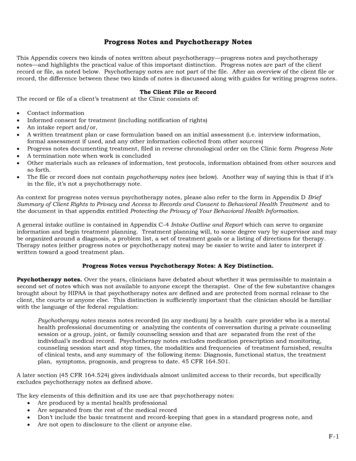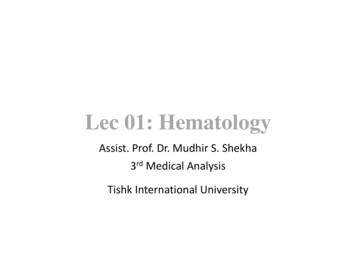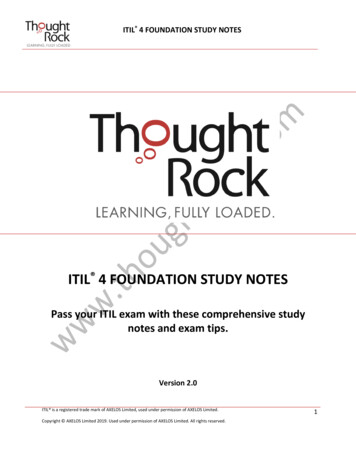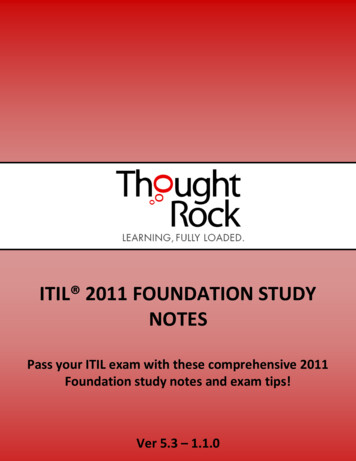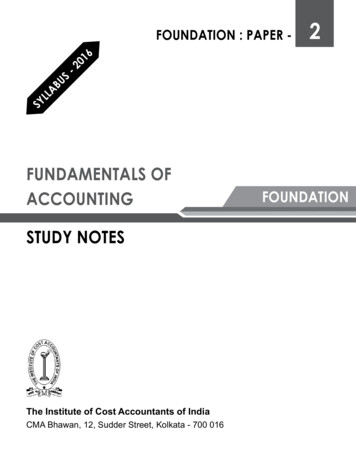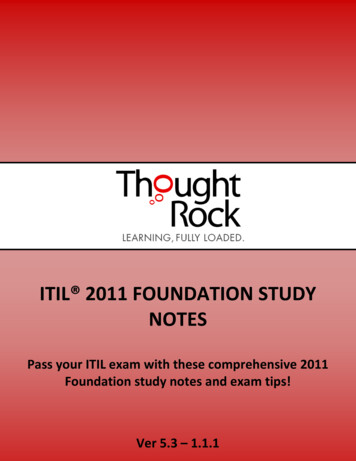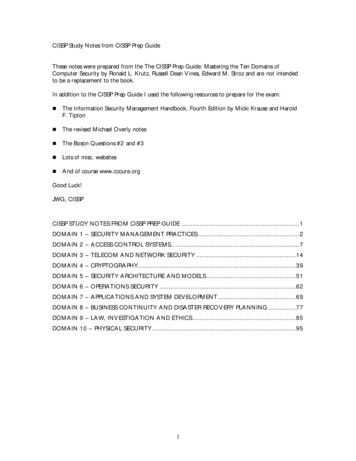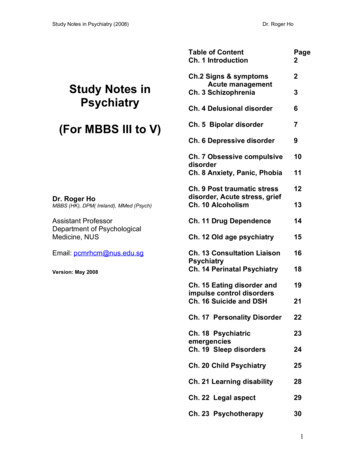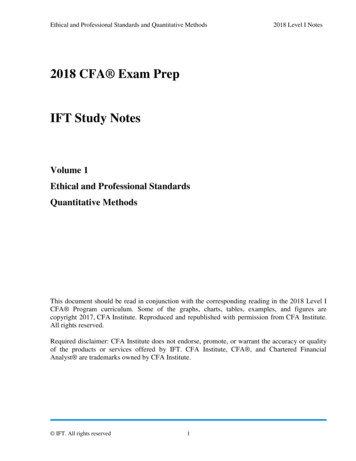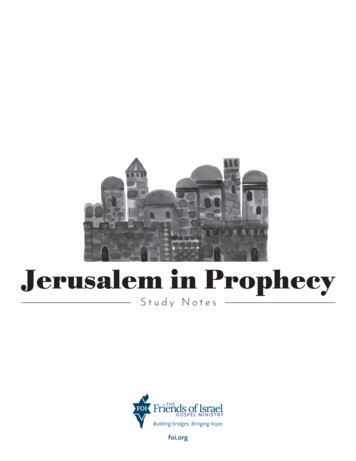
Transcription
Jerusalem in ProphecyStudy NotesTHEFriendsof IsraelG O S P E L M I N I S T RYBuilding bridges. Bringing hope.foi.org
For more information aboutThe Friends of Israel Gospel Ministryvisit www.foi.orgCopyright 2021 by The Friends of Israel Gospel Ministry, Inc. Bellmawr, New Jersey 08099Unless otherwise noted all Scripture quotations are taken from the New King James Version .Copyright 1982 by Thomas Nelson, Inc. Used by permission.All rights reserved. No part of this study guide may be reproduced, stored in a retrievalsystem, or transmitted, in any form or by any means, electronic, mechanical, photocopying,recording, otherwise, without prior written permission of the publisher. For information,address The Friends of Israel Gospel Ministry, Inc. P.O. Box 908 Bellmawr, NJ 08099
The DawnJ i m S hower sI.Jerusalem in ProphecyA. “The land of the Bible and the message of the Bible are forever connected. You just can’t separate the two!”1. This study: Jerusalem in Prophecya. Jerusalem is not just a geographic locationi. It is central to the message of the Bible2. The name “Jerusalem” occurs:a. 669 in OT, 144 in NT, over 2/5 (350) are prophetic3. No other city gains the importance of JerusalemB.Uniquely chosen by God (2 Chr. 6:6; Ps. 132:13)1. He placed Jerusalem at the center of the nations (Ezek. 5:5)a. Not a major city of commerce2. Not on a major international highwaya. On the spine of Judean Mountain range3. Not an easy place to reach or frequenta. All roads ascend to Jerusalem—to meet Godi. 36 miles east Med. Coast, 16 miles west Dead Seaii. 2,500 feet above sea levelC. The Bible has many titles for Jerusalem1. The city (Jer. 32:24; Ezek. 7:23)2. The city of God (Ps. 46:4; 87:3)3. The city of our God (Ps. 48:1, 8)4. The city of the LORD (Yahweh) (Ps. 101:8, Isa. 60:14)5. The city of the LORD (Yahweh) of Hosts (Ps. 48:8)6. The city of righteousness (Isa. 1:26)7. The holy city (Isa. 48:2, 52:1; Neh. 11:1, 18; Mt. 4:5)8. Your holy city (Dan. 9:24)9. The faithful city (Zech. 8:3)10. The city of Judah (2 Chr. 25:28)11. The city of David (2 Sam. 5:9; Lk. 2:4, 9)12. The city of the great King (Mt. 5:35)Jerusalem in Prophecy foi.orgPage 3
II. The Dawn of Jerusalem: The City of GodA.First appears in Gen. 14:181. Called “Salem” in Gen. 14:18; Ps. 76:2a. In Hebrew it is Shalem, which means, “peace”i. Jerusalem means “city of peace”B. Jerusalem is introduced as the city of the king-priest1. Abraham returning from victory over Lot’s captors (Gen. 14:17–20)a. Is met in the valley of the kings (Kidron Valley?) (v. 17)i. By Melchizedek bringing bread and wine (v. 18)2. Melchizedek, King of Salem (Peace) (v. 18)a. Name means, “king of righteousness”b. The priest of God Most High (v. 18)3. Melchizedek is God’s King – Priest (a Theophany?)a. As king, he brings a gift of peace – bread & wine (v. 18)i. In time they become elements of communionb. As priest, he blesses Abrahami. “Blessed be Abram by God Most High” (vv. 19–20)1. Possessor of heaven and Earth2. Who gave Abram victory over his enemiesii. He blesses the one who had the promises (Heb. 7:6)1. The inferior is blessed by the superior (v. 7)c. Abraham gave him a tithe (10%) of the spoils (v. 2)i. He is Abraham’s spiritual superior (v. 4)1. Abraham gave a tithe to the greater oned. Melchizedek priesthood (v. 3)i. He is without father or mother or genealogy1. Not a priest by family right2. Has neither beginning of days or end of lifeii. Not a priest by law but by the basis of an indestructible life (v. 16)1. Superior to Levitical priesthoodiii. Melchizedek resembles the Son of God1. He continues a priest forever (vv. 3, 24)4. Why spend so much time on one event?a. Melchizedek connects Jerusalem to Jesus Christb. Writer of Hebrews said we should know, “the basic principles of the oracles of God” (Heb. 5:12)Jerusalem in Prophecy foi.orgPage 4
C. The Dawn of Jerusalem1. Connects Jerusalem with God’s plan for the agesa. Center stage for God’s redemptive plan2. Jesus Christ is of the order of Melchizedek (Heb. 7:17)a. He is a priest forever (Ps. 110:4)b. Not by a law that made nothing perfect (Heb. 7:19)3. Jesus is a guarantor of a better covenant (v. 23)a. New covenant – promise of salvation (v. 8:7–13)4. From its beginning in Scripturea. Jerusalem is linked to the promise of redemptionb. Name “Salem” reminds us of the ultimate endingi. God will restore His Kingdomii. Peace in God’s Kingdom on Earth5. Jerusalem is the epicenter of God’s redemptive worka. “The land of the Bible and the message of the Bible are forever connected. You just can’t separate thetwo!”D. Abram sacrifices Isaac on Mt. Moriah (Gen. 22:2)1. Jerusalem not mentioneda. Mt. Moriah is the location of the Temple (2 Chr. 3:1)2. Foreshadowing of the great sacrifice to comea. Father Abram is willing to sacrifice his promised soni. God provided a substitute3. God’s redemption plays out in JerusalemE. Jerusalem remains in Gentile hands until Israel has a godly king (2 Sam. 5:6–10)1. When David conquers the Jebusite city of JerusalemF.So why study Jerusalem in Prophecy?1. Prophecy is God’s way of sharing His redemptive plana. Gives us discernment to know the truth from liesi. Also holds us accountable2. Our salvation is rooted in the promises God made to Israel (Rom. 11)Jerusalem in Prophecy foi.orgPage 5
a. And it plays out in the fulfillment of prophecyi. Jesus’ First Coming fulfilled many prophecies1. Proof He was the true Messiahii. Jesus’ Second Coming is mapped out in unfulfilled prophecy1. Where? In Jerusalem» Jesus will return to Jerusalem» Jesus will rule from Jerusalem» Jesus will rule for all eternity in a New JerusalemG. When we study Jerusalem in Prophecy1. Some is fulfilled prophecy2. Some is prophecy being fulfilled3. Some is prophecy yet to be fulfilledH. In this study of Jerusalem in Prophecy1. The Dawn – the redemption connection2. Glory Days – King David and Solomon3. Corruption of God’s City – ungodly kings4. Glory Lost – destruction of Jerusalem & exile5. Scattered & Trampled – God’s use of Gentiles6. Messianic Hope Rejected – missed opportunity7. Birthplace of the Church – sprouted and grew8. Jewish Return – modern day miracle9. Tribulation Repentance – Jewish restoration to God10. Messianic Deliverance – return of Messiah11. Glory Returned – capital of God’s Kingdom12. A New Jerusalem – the ultimate endingIII. Jerusalem Is Important to YouA. Your destiny was secured in Jerusalem1. When Jesus Christ came, died, and rose again2. “Believe on the Lord Jesus Christ and you will be saved” (Acts 16:31).a. Jesus said, “unless one is born again he cannot see the kingdom of God” (Jn. 3:3).B. We are commanded to pray for the peace of Jerusalem (Ps. 122:6).Jerusalem in Prophecy foi.orgPage 6
Glory DaysC hr i s Kat u l kaThe Torah alludes to Jerusalem’s significance in God’s redemptive plan—from Melchizedek, king of Salem, to Abraham’sbinding of Isaac at Mount Moriah to God’s declaration that He had a specific place in mind where He would residewhen the Israelites entered the land. He sovereignly chose a place that would be identified with His name and His glory(Dt. 12:11). That place is Jerusalem, the city of peace.Jerusalem was chosen for its strategic placement to bring unity and peace to the tribes of Israel and to become thecentral location of worship to God.Inside the city walls, King David received a promise from God that he would have a Son that would sit on his throneand rule from Jerusalem forever. God’s promise would resonate throughout Israelite history, searching for David’s Son,the King of Israel, who would fulfill the divine promise.Famous Israeli poet, Yehuda Amichai wrote Jerusalem is a “port city on the shore of eternity.” It’s God’s footstool, theplace where heaven and Earth touch, where redemption would be paid, and where the King of Kings would reign!I.The Glory of God with Israel (Ex. 40:34–38; 1 Ki. 8:6–12)II.David’s Promise and Prosperity (2 Sam. 7:4–16; 1 Ki. 3—11)III. Jerusalem: Centerpiece of the Nations (Ezek. 5:5; Ps. 99)Jerusalem in Prophecy foi.orgPage 7
God’s City CorruptedDan P r i c eIntroduction: Joshua 8 and Deuteronomy 27: Dramatic curses that foreshadow Jerusalem’s declineProposition: The corruption of Jerusalem during the divided kingdom was because of the kings’ divided hearts for 1. God’s Laws2. God’s Prophets3. God’s TempleI.An overview of the history of the kings of Judah and Jerusalem:A. Two Bad Kings to StartB. Two Good KingsC. A Family of Three Bad RulersD. Four Really Good KingsE. Alternating the Five Worst and Best KingsF.II.Four Beaten Vassal KingsHighlighting the kings’ divided hearts:A.For God’s Laws (Even the good kings!)B.For God’s ProphetsC. For God’s TempleIII. Three thoughts for application from the days of Jerusalem’s corruption:A.History shows us God’s slow anger and immense patience with His peopleB.History reminds us that God always does what He said He’ll do - He keeps His promises!C. History warns us about half-hearted relationships with GodJerusalem in Prophecy foi.orgPage 8
Dan Price, M.Div.The Friends of Israel Gospel Ministry2020United Kingdom of IsraelYearsKingBegin / EndRelationship toPredecessorProphetEnd of Reign1 & 2 Samuel1 & 2 Kings1 & 2 Chronicles1050-1010SaulGood/Evil-SamuelSuicide1 Sa 8-31-1 Chr 9-101010 - 970DavidGood/GoodCaptain forSamuelNathanDied1 Sa 16-312 Sa 1-241 Ki 1-21 Chr 11-29970 - 930SolomonGood/EvilSon ofNathanDied-1 Ki 2-112 Chr 1-9Kingdom of Judah (Southern hoshaphat Good/GoodProphetShemaiahHananiJehuEliezerRel. to Pred.End of ReignSon ofDiedSon ofDiedSon ofSon ofDivided Kingdoms of IsraelIsaiah1&2Chronicles1 Ki 12, 14 2 Chr 10-121 & 2 Kings1 Ki 15DiedI Ki 15Died1 Ki 222 Chr 132 Chr 14-162 Chr 17-20848-841841JehoramAhaziahEvil/EvilEvil/EvilSon ofSon ofGod JudgedKilled by Jehu2 Ki 82 Ki 8-92 Chr 212 Chr 22841-835Athaliah (Q)Evil/EvilStep-Mother ofKilled in Coup2 Ki 112 Chr 22-23835-796JoashGood/EvilSon of AhaziahKilled by Servants796-767Amaziah767-740Uzziah(aka Azariah)Good/EvilSon ofGood/Evil2 Ki 11-12 2 Chr 23-24Assassinated2 Ki 14Leprosy2 Ki 152 Chr 26Son ofDied2 Ki 152 Chr 272 Ki 162 Chr EvilSon ofDiedIsa 7716-687HezekiahGood/GoodSon ofDiedIsa 36-39Micah687-642ManassehEvil/GoodSon ofDied2 Ki 212 Chr 33AmonEvil/EvilSon ofAssassinated2 Ki 212 Chr 33640-608JosiahGood/GoodSon 97-586ZedekiahEvil/EvilSon of(Bro. ofJehoiakim)Brother(Son of Josiah)931-910Jeroboam lEvil/Evil874-853AhabEvil/EvilEnd of Reign1 & 2 Kings1&2ChroniclesCaptian forJudged by God1 Ki 12-142 Chr 10Son ofCaptain forSon ofCaptain forCaptain forKilled by BaashaDiedKilled by ZimriSuicideDied1 Ki 151 Ki 161 Ki 161 Ki 161 Ki 16Son ofBattle1 Ki 172 Chr 18Son ofFell1 Ki 222 Ki 1Brother(son of Ahab)Killed by Jehu2 Ki 3, 92 Ki 9-10Begin/End Prophet Rel. to lCaptain forDied814-798JehoahazEvil/EvilSon ofDied2 Ki 13798-782JehoashEvil/EvilSon ofDied2 Ki 13-14Elisha782-753Jeroboam IIEvil/EvilSon ofDied2 Ki 14753-752ZechariahEvil/EvilAmosSon ofKilled by Shallum2 Ki ilEvil/EvilHoseaCaptain forCaptain forSon ofCaptain forCaptain forKilled by MenahemDiedKilled by PekahKilled by HosheaDeposed to Assyria2 Ki 152 Ki 152 Ki 152 Ki 152 Ki 17Micah722 - Fall of Samaria and Israel into Assyrian captivity2 Ki 18-20 2 Chr 29-32642-640HabakkukKing2 Chr 25Son of748-732 (4840)Kingdom of Israel (Northern Kingdom)Years2 Ki 22-23 2 Chr 34-35Exile in Egypt2 Ki 232 Chr 36Seige of Jerusalem2 Ki 23-242 Chr 36Son ofExile in Babylon2 Ki 24-252 Chr 36Uncle of(Son of Josiah)Exile in Babylon2 Ki 24-252 Chr 36586 - Fall of Jerusalem and Judah into Babylonian captivity586-450Exile in BabylonJeremiahHaggaiZechariahMalachiJerusalem in Prophecy foi.orgPage 9
Glory LostM i ke S t al l ardI.IntroductionA. A funeral for a city – Lam. 1:1–7, 13–17II. Jerusalem and Israel’s sinA. God’s historical plan: blessings and curses1. Removal from the land of blessing (Dt. 28:63–66)B.Description of Israel’s sin from within the Babylonian Captivity1. Ezekiela. Israel was a rebellious nation (2:3)b. Israel was worse than the surrounding nations (5:7–8)c. Israel defiled the sanctuary (5:11)d. Israel experienced a singular disaster and doom (7:5–8)e. Israel mixed worship of the one true God with false idols (8:9–18)f. The glory departs from the Temple in Jerusalem (10:18)g. Jerusalem’s sin is like Sodom’s sin (16:48–50)2. Daniel 9:4–15III. The Judgment upon Jerusalem & IsraelDeportations (Exile) to BabylonJeremiah 52:28–31; 2 Kings 24:18—25:30; Daniel 1Three Major Deportations1st Deportation – 606/605 BCDaniel taken captiveArticles from the Temple compoundtaken to Babylon2nd Deportation – 597/596 BCEzekiel taken captiveArticles from the Temple compoundtaken to BabylonJeremiah taken to EgyptJerusalem & Temple completelydestroyed(7th year of Nebuchadnezzar)3rd Deportation – 587/586 BC(18th year of Nebuchadnezzar)An Additional Deportation4th Deportation – 581 BC(23rd year of Nebuchadnezzar)Judea continues rebellion againstBabylonJerusalem in Prophecy foi.orgNote: Calendar dates vary becauseof different calendars being used(Judean, Babylonian, etc.) anddifferences in measuring the reigns ofkingsPage 10
IV. The Time of Captivity – 70 yearsA.How is this time measured?1. Jeremiah 25:11–12; 29:10; Daniel 9:2a. The Servitudeb. The Captivityc. The Desolations2. Measurement of the 70 yearsa. From 605 to 536 BC – then Jews begin to return homeb. From 587 to 517 BC – then the Temple was rebuiltV.God Offers Hope in the Midst of the Darkness and DestructionA.Ezekiel 36—48B.Daniel 9: The Seventy Weeks ProphecyC. Daniel 10—12: Further predictions for the history of Israel and its ultimate national and spiritual restorationD. Fulfillment of Deuteronomy 29—321. Reaffirmation of the land promises and blessings in the land (30:3–5)Jerusalem in Prophecy foi.orgPage 11
Scattered and TrampledB r u c e S c ot tI.IntroductionA. Tragically, we have all heard stories of people sometimes getting trampled upon by accident (see Josephus,Wars 2:223-227 [2.12.1]). A recent tragedy (April 30, 2021) occurred in Israel during an event attended by closeto 100,000 Haredi (Ultra-Orthodox) Jews. “Forty-five men and boys at the event were killed [in a crowd crush],and about 150 were injured, dozens of them critically, making it the deadliest civil disaster in the history of theState of Israel” (“2021 Meron crowd crush,” Wikipedia).B. Sometimes, however, trampling others is on purpose, as when the Romans destroyed Jerusalem and the Templein AD 70 (see Josephus, Wars 6:276 [6.5.1]).C. In Luke 21:24, Jesus predicted the calamity of the destruction of Jerusalem, “And they will fall by the edge of thesword, and be led away captive into all nations. And Jerusalem will be trampled by Gentiles until the times ofthe Gentiles are fulfilled.”D. The Greek word for trampled (πατέω, pateō) means “to tread heavily with feet, with implication of destructiveintent.” It was used both literally and figuratively “of the undisciplined swarming of a victorious army througha conquered city. Its heedlessness, which acknowledges no limits, causes [pateō] to take on the sense ‘mistreat,abuse’ and ‘tread contemptuously under foot’” (BDAG Greek Lexicon, s.v. “πατέω,” 786). It is the same wordused in Revelation 11:2, speaking of a future Gentile trampling of Jerusalem during the Tribulation Period. Theauthor of Hebrews also uses a form of the word to warn of the punishment of those who regard the Son of Godas having no importance, “Of how much worse punishment, do you suppose, will he be thought worthy who hastrampled the Son of God underfoot . . . ?” (Heb. 10:29)E. Jesus predicted that Gentile nations would conquer Jerusalem and tread upon it in a contemptuous manner. Hecalled this period “the times of the Gentiles.”F.What is the “times of the Gentiles”?1. It is not to be confused with the phrase “the fullness of the Gentiles” (Rom. 11:25), which speaks of the fullnumber of Gentile people God will save during the Church Age.2. The “times of the Gentiles” speaks of a period of time during which Gentile powers will conquer and treatcontemptuously the city of Jerusalem, because Jerusalem represents the nation of Israel as a whole.G. When did the “times of the Gentiles” begin and when will it end?1. The times of the Gentiles began with Babylon under King Nebuchadnezzar and will continue all the waythrough the Tribulation Period during the final manifestation of the Revived Roman Empire (as seen inNebuchadnezzar’s vision in Daniel 2).H. Following the return of the exiles from Babylon and the rebuilding of the Temple, Gentile powers continued toconquer and show contempt toward the city of Jerusalem over the centuries. They wanted Jerusalem for theirown. “No other place evokes such a desire for exclusive possession” (Simon Sebag Montefiore, Jerusalem: TheBiography [New York: Alfred A. Knopf, 2011], p. xxv).I.We will look at three Gentile centers of influence that have had the most impact on the world, and on the cityof Jerusalem. That impact is still being felt today.Jerusalem in Prophecy foi.orgPage 12
II. Athens - Center of PhilosophyA.Developed democracy as a form of governmentB. Attracted geniuses in the areas of art, science, mathematics, literature, and philosophyC. Alexander the Great (356—323 BC)D. Antiochus IV (Epiphanes; c. 215—164 BC)E. Maccabean Revolt and Hanukkah (167—160 BC)F.Hasmonean Kingdom and Power Struggle (142—63 BC)G. Athens’ Impact on JerusalemIII. Rome - Center of PowerA.Legendary Founder RomulusB.Known as the City of Seven Hills, the Eternal City, and the Capital of the WorldC. Pagan Rome (63 BC—AD 313)1. Pompey enters Jerusalem (63 BC)2. Herod the King (Great) installed as client-king (37 BC)3. Roman Governors (Prefects and Procurators; AD 6—66)4. First Jewish Revolt (AD 66—73)5. Second Jewish Revolt Led by False Messiah Bar Kochba (AD 132—135)6. Emperor Hadrian’s Attempted Erasure of Jerusalem’s and Israel’s IdentitiesD. “Christian Rome”1. The Byzantine Era (AD 313—636)2. Crusaders and the Kingdom of Jerusalem (AD 1099—1291)E. Rome’s Impact on JerusalemIV. Mecca - Center of PilgrimageA. The Kaaba and the Black StoneB. The Rise of Mohammed the ProphetJerusalem in Prophecy foi.orgPage 13
C. The Spread of Islam over Jerusalem (AD 636—1099, 1291—1917)1. Arab Muslims (AD 636—1091)2. Seljuk (Turkish/Persian) Muslims (AD 1091—1099)3. Mamluk (Egyptian) Muslims (AD 1291—1517)4. Ottoman (Turkish) Muslims (AD 1517—1917)D. Today, there are 1.8 billion Muslims in the world (24% of the world’s population). It is the fastest growing religionin the world. Almost 2.5 million Muslims a year make pilgrimage to Mecca.E. Mecca’s Impact on JerusalemV. The Reason for the Times of the Gentiles: To Bring Judgment Both on Jerusalem and on the GentilesVI. Jerusalem - Center of the WorldA. Jesus put a limit on “the times of the Gentiles.” He said, “until the times of the Gentiles are fulfilled.” Those timesend at the Second Coming of Christ (as seen in Nebuchadnezzar’s vision in Daniel 2).B. The prophet Isaiah tells us that one day God will “[purge] the blood of Jerusalem from her midst” (Isa. 4:4).Jerusalem will then be greater than Athens in philosophy, greater than Rome in power, and greater than Meccain pilgrimage.1. “Now it shall come to pass in the latter days that the mountain of the LORD’S house shall be established onthe top of the mountains, and shall be exalted above the hills; And all nations shall flow to it. Many peopleshall come and say, ‘Come, and let us go up to the mountain of the LORD, to the house of the God of Jacob;He will teach us His ways, and we shall walk in His paths.’ For out of Zion shall go forth the law, and theword of the LORD from Jerusalem” (Isa. 2:2–3).C. Despite all the attempts of wicked forces (Ps. 83:3–8) to conquer and show contempt for Jerusalem, to trampleon her, they will all ultimately fail. That is because Jerusalem is the City of God (Ps. 46:4), the city of the greatKing (Mt. 5:35), and the center of the world - “Thus says the Lord GOD: ‘This is Jerusalem; I have set her in themidst [center] of the nations and the countries all around her” (Ezek. 5:5).D. “Glorious things are spoken of you, O city of God!” (Ps. 87:3).E. For centuries, Jewish people scattered around the world have exclaimed at the conclusion of their festivals ayearning for their ancient city. They cry out, “Next year in Jerusalem!” May that expectation come true verysoon.Jerusalem in Prophecy foi.orgPage 14
Messianic Hope RejectedS t eve Her z i gI.IntroductionA.Prayers recited1. Yigdal (“may He be magnified”)2. Ani Ma’amin, (I believe)B.II.Passover Seder (“Next Year in Jerusalem”)Place of Hope - JerusalemA.Place of God’s name (Temple)B.Place in the middle of nations (Ezek. 5:5)C. Place of fulfilled promises1. Genesis 3:15, the promise of the Seed of the woman2. Genesis 12:1–4, the promise of a land, a seed and blessing and3. 2 Samuel 7:16, the promise of throne foreverD. Place for Messiah1. Randall Price puts it this way: “Jerusalem was indispensable to the preparation of Christ’s First Coming,being restored from ruin (Isa. 52:7–12) to fulfill its role in the Messianic advent as the city of the greatKing. Indeed Jesus was sent to Jerusalem (Mt. 23:37) and the city served to mark defining moments in Jesusearthly life and ministry.”III. Person of Hope - Jesus MessiahA.Dedicated in Jerusalem (Lk. 2:22–38)B.Distinguished Student (Lk. 2:47)C. Demonstrated through miracles (Mt. 8—10)1. Raised Lazarus (Jn. 11:1–44) (six weeks before crucifixion)2. Reaction of People3. Reaction of LeadersJerusalem in Prophecy foi.orgPage 15
IV. Passing Up Hope - Rejected by Jewish LeadersA.Politicising reality (Jn. 11:47): What shall we do?B.Prophesying Messiah’s death (Jn. 11:50)C. Plotting to kill Him (Jn. 11:53)V.Passion of Messiah in Jerusalem Sunday to SundayA.Precise PlanB.His PresentationC. His ProclamationD. His PreparationE. His PassoverVI. Persistent BlindnessA.Partial (Rom. 11:25)B.Purposeful (Rom. 11:26; Zech. 14:4)Jerusalem in Prophecy foi.orgPage 16
Birth of the ChurchM i ke S t al l ardI.IntroductionA.How do many modern Israelis view Christianity?1. Some have never really seen or understood biblical Christianity2. Some view it as an imposition of the Western world that has nothing to do with the Middle East or IsraelB.II.Does Friends of Israel care about the church?PromiseA.Resurrection appearances of Jesus (Acts 1:1–3)B.Promise of the Father – the baptism of the Holy Spirit (Acts 1:4–6)C. Promise of witnessing power (Acts 1:7–8)D. Ascension of Christ (Acts 1:9–11)E. Birthday of the church in Jerusalem (Acts 2)III. PersecutionA.Peter and John arrested for their ministry (Acts 3—4)B. All the apostles imprisoned for their ministry (Acts 5:17–42)C. Stephen preaches and is killed (Acts 6:9—7:60)D. Jerusalem church is scattered by persecution (Acts 8:1–3)Jerusalem in Prophecy foi.orgPage 17
IV. ProclamationA. Acts 2:41 – 3,000 soulsB. Acts 4:4 – 5,000 menC. Acts 5:12-16 – multitudes of both men and womenD. Outside of Jerusalem1. Acts 8 – multitudes come to the Lord in Samaria2. Acts 10:44-48 – the Gentile Cornelius and his household come to faith3. Missionary journeys of the apostle Paul (begin in Acts 13)4. Acts 19:1-7 – disciples of John the BaptistThe Plan of ActsLuke 24:47; Acts 1:8The Transitional Fulfillment Of Acts:The Geographical Manifestation of the SpiritJerusalem & JudeaSamariaCaesereaEphesusActs 2:1-47Acts 8:14-17Acts 10:44-48Acts 19:1-7The manifestation ofthe Holy Spirit to Jewishbelievers in Jerusalem andthe near areasV.The manifestation of theHoly Spirit to half-Jewishbelievers in SamariaThe manifestation of theHoly Spirit to full-bloodedGentile believers inCaesareaThe manifestation of theHoly Spirit to remotebelievers in Ephesus (in thiscase, Jewish believers)Not ForgottenA. The Church at Jerusalem1. In its poverty, Gentile Christians remember the mother church (1 Cor. 8:1—9:15)B.Israel1. Unlike many believers today, the early Christians in Jerusalem and in Rome remembered Israel’s place inGod’s plan (Acts 1:6; 28:30–31)Jerusalem in Prophecy foi.orgPage 18
The Jewish ReturnC hr i s Kat u l kaJesus prophesied that “Jerusalem will be trampled underfoot by the Gentiles, until the times of the Gentiles are fulfilled”(Lk. 21:24). Forty years after Jesus spoke those words the Romans forcibly expelled Jewish people from the land andrazed Jerusalem in 70 AD. Over the past two millennia the Romans, Byzantine, Muslims, Crusaders, Mamluks, Ottomans,and British governed, divided, and conquered Israel and Jerusalem.In the years leading up to Israel’s rebirth in 1948 groups of Yemeni, Kurdish, and Russian Jews trickled back into theHoly City. In the past century, Jerusalem has seen a population surge, the ancient city has been rebuilt and expandedto its greatest prosperity since Rome destroyed the city. The rebirth of Israel today is nothing short of a miracle, butdoes the return of the Jewish people fulfill all that God promised in the Old Testament prophets, or is there still more tocome?I.An Eye on Jerusalem (Ps. 137:5–6)II.In Our HandsIII. “Prophesy to the breath” (Ezek. 37:1–14)Jerusalem in Prophecy foi.orgPage 19
Tribulation and RepentanceS t eve Her z i gI.IntroductionA.How to destroy the Jews (Jer. 31:35–37)B.Israel finds a way (Miracle Nation)C. Jerusalem keeps coming backD. During its long history: Jerusalem has been destroyed twice, besieged 23 times, attacked 52 times, and capturedand recaptured 44 times.II.Past Tribulations in Jerusalem Before The TribulationA. 1000 BC — The blind and the lame failed (2 Sam. 5:6)B. 586 BC — Babylonian CaptivityC. 332 BC — Alexander the GreatD. 160-167 BC — Maccabean revolt, Jewish holiday of HanukkahE. 63 BC — Roman General Pompey captured JerusalemF.AD 70 — Romans destroy their Temple and exile many JewsG. AD 614 — The Persians capture JerusalemH. AD 629 — Byzantine Christians recapture JerusalemI.AD 1099–1187. — Christian Crusaders occupied Jerusalem, claiming it as a major religious siteJ.AD 1187 — Salladin captures Jerusalem from the CrusadersK. AD 1229–1244 — Crusaders recapture Jerusalem twiceL. AD 1517 — The Ottoman Empire captures Jerusalem; Suleiman rebuilt walls 1538 to 1541M. AD 1917 — The British captured Jerusalem in World War IN. AD 1948 — The state of Israel is established, dividing the city between Israel and JordanO. AD 1967 — Israel captures East Jerusalem and immediately annexes it, granting Arab (Palestinian) residentspermanent resident status, but not citizenshipIII. Promise God Gave to Israel HoldsA.Never destroyed (Jer. 31:35)B.Need to repent (Zech 12:2–3)Jerusalem in Prophecy foi.orgPage 20
IV. Purposeful TroubleA. Gog and Magog (Ezek. 38—39)1. When is the attack?2. Who attacks?3. Why do they attack?4. What are the results?B. The Tribulation (Mt. 24—25; Rev. 6—19; Jer. 30:7) (Jacob’s Trouble)1. Sudden beginning of birth pangs (Mt. 24:8)2. False messiahs (v. 5) (1st Seal: False Messiah)3. Deception (v. 5)4. Wars and rumors of wars (v. 6) (2nd Seal: Peace taken)5. Famine, pestilence, and earthquakes (v. 7) (3rd Seal: Famine; 4th Seal: Death by famine, pestilence, wildbeasts)6. Delivered up to tribulation (v. 9) (5th Seal: Saints killed)7. Antichrist erects an image of himself in the Temple (v. 15)8. Abomination of desolation spoken by Daniel (Dan. 9:27)9. False prophet arises from the world (Rev. 13:11–18)10. Requires all to bow down and worship the image11. He also performs great signs and deceives the world12. Gives breath to image of the Beast to speak13. Kills those who refuse to worship it14. Requires all to take the mark of the Beast to buy and sell15. Puts an end to all other religionsC. Results: Satan’s wrath, man’s wrath and the wrath of God drive Israel to her knees1. Israel is alone2. No prospect for help3. Zech. 12:10 — they repent when they see Him whom they pierced4. Rev. 19:11Jerusalem in Prophecy foi.orgPage 21
Messianic DeliveranceRand al l P r i c eI.Jerusalem is the city at the center of mankind’s hopes and God’s purposes. God loves it, Satan hates it, Jesus weptover it, the Holy Spirit descended in it, the nations are drawn to it, and Christ will return and reign in it. Indeed, thedestiny of the world is tied to the future of Jerusalem. Because of this chosen centrality (Ps. 132:13–18), the Messiah,in bringing deliverance to Israel, will return to Jerusalem where God has promised to redeem and restore His people.II. The Promise of Messianic Deliverance (Zech. 2:10; 8:3–8; Mt. 24:30–42)A. Since the days of the prophets, the Jewish people have believed the Messiah would be revealed only inJerusalem (Zech. 9:9–10). Jesus’ disciples also held this view as seen in their question to their Teacher aboutJerusalem’s predicted destruction: “When will these things be and what will be the sign of Your coming, andof the end of the age?” (Mt. 24:3). The disciples’ question reveals they clearly believed Jerusalem’s future wasconnected to Messiah’s return. At Jesus’ ascension, angels appeared announcing to His disciples His imminentreturn “in just the same way as you have watched Him go into heaven” (Acts 1:11).III. The Purpose for Messianic Deliverance (Zech. 12:1–2; 14:2; Isa. 59:20–21; Rom. 11:26b–27; Lk. 21:28)A. Satan will seek to destroy Israel from the mid-point of the Tribulation (Rev. 11:2/Lk. 21:24; Rev. 12:13–17) and theGentile armies under control of the Antichrist will attack on Jerusalem at the end of the Tribulation(Zech. 12:1–2; 14:2).
A. “The land of the Bible and the message of the Bible are forever connected. You just can’t separate the two!” 1. This study: Jerusalem in Prophecy a. Jerusalem is not just a geographic location i. It is central to the message of the Bible 2. The name “Jerusalem” occurs:

